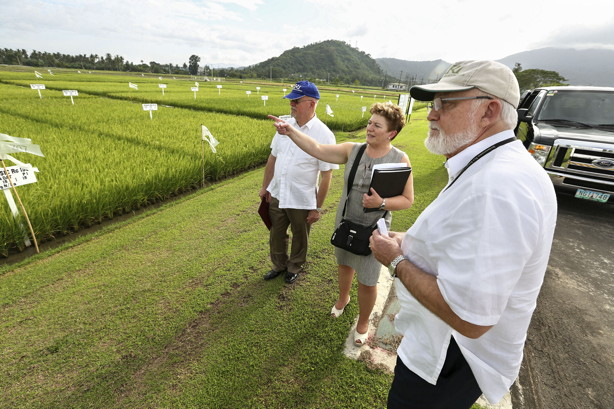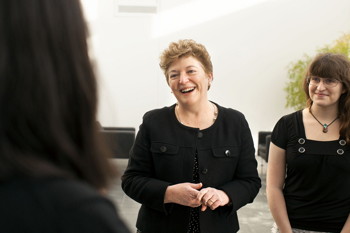COVER STORY
Kathryn Boor '80

During a fall 2012 tour of Asia, Dean Kathryn Boor visited the International Rice Research Institute in the Philippines, hosted by IRRI Director General Robert Zeigler, Ph.D. '82, right, with Ronnie Coffman, Ph.D. '71, left, director of international programs for CALS.
What's the most surprising thing you've heard from a student or faculty member in the past 12 months?
There are surprises in many different categories every single day as a dean. I'd like to reflect on the most surprising thing I've learned recently in the context of new research findings by CALS scientists. I'm a microbiologist by training, and the area I'm tremendously interested in is the human-microbial interface. And so the most surprising thing I've heard recently was some research communicated to me by assistant professor Ruth Ley. Her group has found something absolutely astounding – that the microbes in a woman's GI tract, in her gut, actually change throughout pregnancy. And by the third trimester, these microbes influence the mother's metabolism so that she becomes more resistant to insulin and has a higher blood sugar content. What that does is help to feed and grow the baby. But it also simulates a condition that looks like "metabolic syndrome." The interactions between these microbes and the mother's metabolism are unexpected and very surprising.
What do you see in the near future for your college that will most significantly change experiences?
I see significant changes coming in at least three areas:

CALS Dean Kathryn Boor chats with students, including Kae-Lynn Wilson '13, early on a weekday morning. See larger image
Within 10 years, I predict we will see about a 50 percent turnover in our faculty, based simply on our faculty demographics and hiring patterns. We're in a period of massive faculty renewal … we will bring in many new faces in the next 10 years, at a much faster rate of hiring than we've seen in the past two decades.
I also believe we will start to see that students will be able to take many different pathways to earn credits toward a degree, possibly including the ability to transfer in credits from online courses. Regarding MOOCs, our goal is to be a quick follower in that category. It's one where being the leader is fraught with risk, but being a quick follower is a smart strategy. We will also see huge changes in the use of new instructional technologies right here on campus. And that will be really exciting!
Finally, our students are going to see vastly enhanced international opportunities – certainly 10 years from now, there will be more opportunities to work with faculty overseas and to participate in exchange programs with international partners.
What is one thing most people outside your college don't know about it?
Our college has undergone tremendous evolution over the past 10 or 20 years. We have much greater breadth of programming than I think anyone even here on campus realizes, if they're not in CALS.
We're a powerhouse in the environmental sciences. We have just launched a new major, environmental sciences and sustainability, and for the fall 2013 semester alone, we had more applications for this new major than we saw for the two majors we merged to build it. I think we've hit a sweet spot there.
And we have an incredibly powerful set of programs in the applied social sciences. In general, these programs fall in the sector we call "community and economic vitality." We have the Dyson School of Applied Economics and Management (ranked the No. 3 undergrad business program in the country by BusinessWeek); we have a communication program that's a powerhouse in social media and research; we have a very strong applied social science program as part of natural resources; we have landscape architecture; and we have development sociology. One typically doesn't find breadth and depth like this in a college of agriculture and life sciences.
What belief you had about your job as dean was proven wrong?
I had no idea the job was going to be so much fun. The opportunity to spend time with our incredible alumni, who have accomplished absolutely amazing things, is both inspiring and humbling. I feel similarly about the accomplishments of the faculty and students here on campus. In my first few months as dean, I literally poked in every single corner of the college and was absolutely awestruck by the myriad ways in which we focus our expertise every single day to address really important scientific and social questions. It is a great honor to partner with, and to serve, some of the world's brightest scientists and students.
What's the most profound thing you've learned from one of the other deans at Cornell?
Alan Mathios made this suggestion to me very early in my career: When dealing with an emotionally charged situation, which does happen in this role, he recommended consciously underreacting at first, until all facts are in hand. And that advice has been incredibly valuable! It's really effective – to distance oneself a bit from the emotion, be really conscious about the issues that are on the table.
What's the biggest obstacle to success for your college right now?
Our aging infrastructure. We have these beautiful old buildings and all of them are in need of loving care and attention, and that all means money. And on our Geneva campus [the New York State Agricultural Experiment Station], a lot of those buildings are, on average, 50-60 years old and in dire need of a facelift and more. Our Geneva campus contributes mightily to economic development for our upstate stakeholders. The facilities need to match our abilities and aspirations.
Who are you when you walk out the door of your office, or in the door at home?
My greatest secret pleasure is going to my laboratory here on campus, where I have talented and dedicated staff and students who are working to protect the safety of our food supply. When I walk out of this office and back into my own laboratory, I immerse myself again as a microbiologist.
The DeanKathryn Boor, the Ronald P. Lynch Dean of the College of Agriculture and Life Sciences At Cornell since 1994 Dean since July 2010 Area of expertise: Molecular microbiology focused on bacterial pathogenesis The College of Agriculture and Life SciencesPopulation: 360 faculty members, 3,503 undergraduates, 1,155 graduate students Major areas of future growth: Food and energy systems, the life sciences, the environmental sciences, and economic and community vitality Endowment: $339.3 million (as of February 2013) Cornell Now campaign goal/amount raised so far: $125 million/$82.1 million (as of March 2013) |
<<View entire story as one page>>